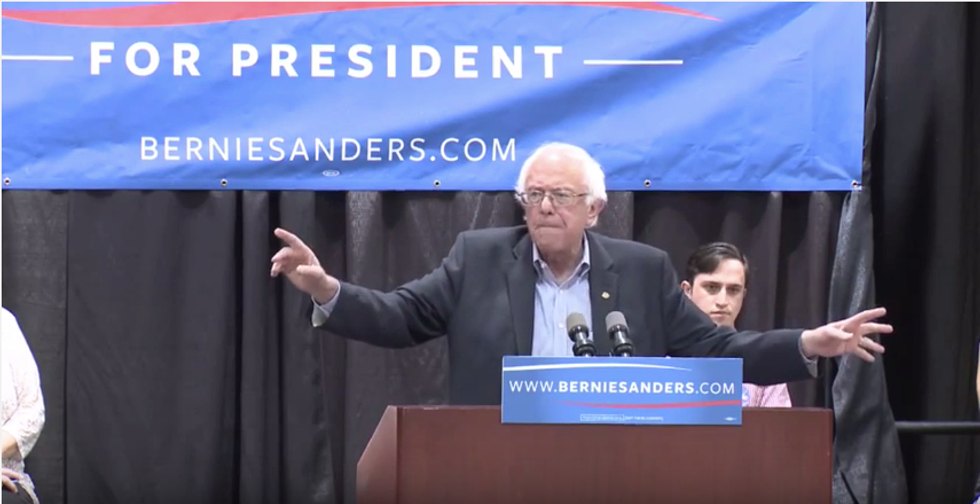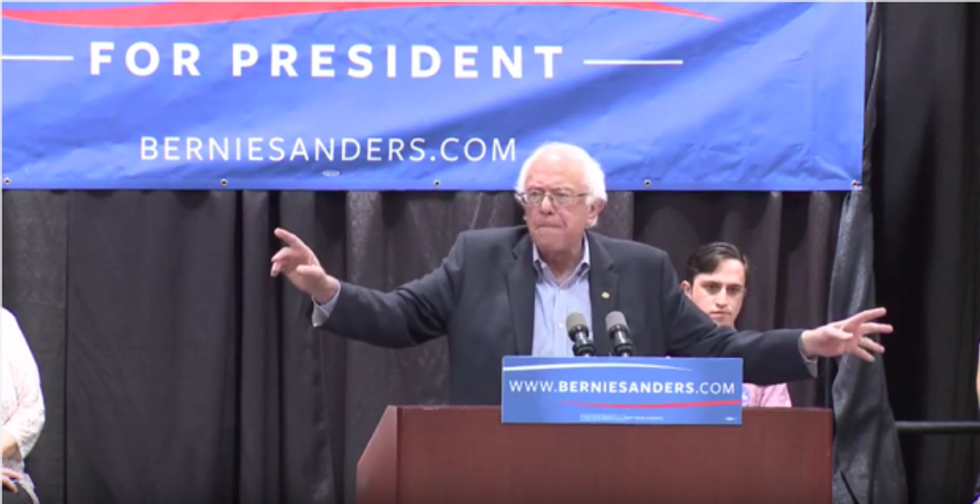
Sen. Bernie Sanders (I-Vermont) spoke to thousands at a campaign event in North Charleston, South Carolina where he promised to be the one president to end institutionalized racism. (Image source: YouTube)

GREENVILLE, S.C. (TheBlaze) — As Sen. Bernie Sanders travelled diagonally through the Palmetto State in two days, one message reverberated with him: Black Lives Matter.
This weekend was the first time Sanders (I-Vermont) visited South Carolina since he announced his campaign to become the next Democratic president, and he brought his populist message to the state's voters in full force — drawing large crowds in the heavily Republican state.
And while Sanders stood in front of seas of doting, mostly white supporters, promising to be the person to end institutional racism once and for all, the 73-year-old also privately met with the state's black leaders.
According to a black pastor who met with Sanders over the weekend, white liberals are enamored by Sanders and blacks are wildly curious about him. Speaking to TheBlaze on the condition of anonymity, the pastor said that while Sanders still seems out of touch with "disenfranchised black folk," his messaging seems to be getting better over time.

"If elected president of the United States, let me be very clear," Sanders stated Saturday in North Charleston, a city with a majority black population. "And that is nobody will fight harder to end institutional racism and to reform our broken criminal justice system." He's repeated that promise multiple times on the campaign trail.
"The bad news is, as everyone in this room today knows, that racism still remains a much-too-real part of American society. No one can deny that," Sanders said, recalling the 21-year-old white man who walked into a historically black Charleston church and fatally shot nine members.
Sanders read off a list of black people who've died during altercations with police or while in police custody and called for a change, slamming police departments nationwide for being too "heavily militarized."
"We must be very clear that we are going to end institutional racism and we are going to transform and make radical changes in a criminal justice system that is broken," Sanders said.
Antonia Okafor, a black 25-year-old student activist, told TheBlaze that Sanders had some validity by discussing issues that heavily affect blacks. But she argued that while it's beneficial for candidates like Sanders to focus on minority demands that have arisen from the Black Lives Matter movement, the policies presidential candidate Sen. Rand Paul (R-Kentucky) has proposed — such as criminal justice reform, school choice and economic freedom zones — would be better suited to help blacks.
"Those are solutions that heavily affect African-American and Latino populations," Okafor said. "Those solutions actually lift people out of poverty and alleviate many of the concerns that minority populations have."
"[Sanders] is playing on the false promise Democrats have been promising the African-American community for generations," said Okafor, the Texas coordinator for Paul's grassroots student organization, Students for Rand. "They basically stereotype us to think that what's best for us is dependency on the government."
After Sanders abandoned his stage and microphone when Black Lives Matter activists took over his event in Seattle earlier this month, Sanders' presidential campaign hired Symone Sanders, a young black activist, as his national press secretary.
"Today we know, our voting rights as well as our family values, our quality of education and black lives are under attack," she said before introducing Sanders in Charleston. "We know we still have work to do, and with it we need people we trust leading this country to get the work done."
South Carolina's Republican roots provide an "interesting dynamic" for Sanders' populist platform, Bakari Sellers, a former South Carolina state representative, told TheBlaze in an interview.
"South Carolina is an interesting place and he’s going to have to figure [his] message out or else he’ll just have trouble winning this primary or even getting close," Sellers, 30, said.
"His challenge now is getting that message into the places where African-Americans congregate, eat, sleep and pray," Sellers said. "It still has yet to be seen whether or not he will meet voters where they are. I believe that he’s willing to; it’s just a challenge to say the least."
But Sellers said the more Sanders has remained on the campaign trail, the more he's evolved his message — and the more he has developed as a candidate.
Still, black leaders in South Carolina who spoke to TheBlaze expressed concerns that while Sanders' talking points sound good, he still hasn't quite grasped the full reasoning behind their quest for racial equality — and Sellers agreed, telling TheBlaze that he shares that "hesitation about Bernie."
Citing the recent mistrial in the Charlotte police officer's case and another young black man fatally shot by police in St. Louis on Wednesday, Sellers said many black South Carolinians want to see are more than mere talking points.
"There are lives that are being lost, and so I think that Bernie has put off and has a hard time grappling with the anger and the visceral emotions that many African-Americans are going through now," Sellers said. "I think there are some who really want him to grasp that, and he is starting to. I just don’t know if it will be enough."
For D.C. Swinton, a black community organizer in Baltimore, Sanders' populist message — specifically him discussing plans to grow the middle class and keep people out of poverty — is a tailor-made message for South Carolina, the state where Swinton was raised. Swinton also said Sanders needs to focus more on education, specifically blaming school choice for what he sees as the "resegregation of schools."
"If [Sanders] can reach out to folks who consistently vote Republican and talk about how he wants to help them and not corporate interests, he could sway some of them," Swinton told TheBlaze.
Swinton unsuccessfully ran for a state representative seat in South Carolina in 2010 and 2012.
Sanders' anti-corporate rhetoric while campaigning in South Carolina often harkened back to the Occupy movement with harsh criticism directed toward the "1 percent," or the wealthiest Americans. The issue of inequality, Sanders said, is today's greatest moral, economic and political issue.
"And what we are saying in this campaign is something no other candidate will say, and that is we cannot bring about the kind of changes that we need in this country unless there is a political revolution," Sanders said in North Charleston to cheers.
Growing the economy, especially through small businesses, is instrumental, especially within minority communities, Zuri Davis told TheBlaze
"Bernie Sanders is not the candidate for minorities, especially for the black community. His participation in the civil rights movement was very much appreciated, but his economic illiteracy is dangerous," the black 19-year-old said. "For far too long, the black community has suffered under terrible economic policy, facing barriers to entry for local business. We need a candidate with sound economics."
The Florida native said her family's small business helped them prosper despite living in a time and area where racial prejudice and segregation was prevalent.
"Small business has helped many in my community make a good living, as well as give back to the community," said Davis, an editorial assistant for Rare Politics, a libertarian-leaning online news site. "The community knows what it needs, and we cannot prosper when we are held down by poor economics."
As Sanders climbs in the polls and begins to gain on Democratic frontrunner Hillary Clinton, Sellers said it's important for Sanders to continue to focus on criminal justice reform — something he and Paul has in common — and education.
Sanders hasn't been the only Democratic presidential contender who's experienced media-grabbing gaffes with the Black Lives Matter crowd — which may have played an important part in the evolution of his message to minority groups.
While two black sisters sang Republican frontrunner Donald Trump's praises all the way to YouTube stardom, Clinton told a group of Black Lives Matter activists that she would only address their concerns with white people and former Maryland Gov. Martin O'Malley walked back his statement of "all lives matter" in response to a group of activists.
But from what Sellers said, these situations can help candidates advance on their messaging, including Vice President Joe Biden if he does decide to run for office.
“You have three white Democrats who are 70-years-old, trying to adjust in a campaign setting that’s fit for 2015, in a world that’s quickly becoming browner and younger," Sellers said.
—
Follow Kaitlyn Schallhorn (@K_Schallhorn) on Twitter